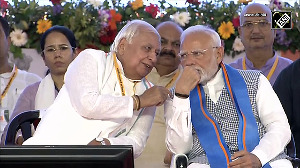The network could provide Pakistan with hundreds of millions of dollars in fees, and tie together two of the world's most bitter rivals. It would be, the region's media like to say, a 'peace pipeline'.
But the $4 billion pipeline plan, first floated a decade ago and energized by recent steps forward in the India-Pakistan peace process, remains mired in politics, financial questions and most importantly diplomacy.
"India's needs of energy are increasing at an explosive rate," Prime Minister Manmohan Singh said last week during a visit to Afghanistan. He insisted that India was moving ahead with both the Iranian pipeline plan and another proposed project for a gas pipeline from Turkmenistan to India through Afghanistan and Pakistan.
"It is not a question of preferring one or the other," Singh said. "We need both the pipelines." But it's not that simple. Politicians have voiced concerns about the security of the Iran pipeline as it passes through Pakistan, particularly the restive region of Baluchistan.
Top Indian officials, including Singh, have warned that the plan is still in "preliminary stages" of financing and feasibility.
And looming over the project is a nervous White House, which is trying to pressure Iran over its nuclear program and doesn't want such massive investments in a country it is anxious to isolate.
Washington has made it clear to India and Pakistan that it doesn't want the plan to go forward.
"Our views concerning Iran are very well known by this time, and we have communicated to the Indian government our concerns about gas pipeline cooperation between Iran and India," US Secretary of State Condoleezza Rice told NDTV during a visit to New Delhi earlier this year.
In July, the terminology grew a little harsher, with US Undersecretary of State Anthony Wayne telling the US Senate Foreign Relations Committee that India and China, in their search for new energy sources, are both willing "to invest in countries that are pursuing policies that are harmful to global stability," and saying some deals "raise concerns under US law and policy."
But India, whose economy has been growing at 6 percent annually for the past decade, must import more than 65 percent of its oil. Now, it's trapped between its voracious demands for energy and its increasingly close relationship with Washington.
During a July visit to Washington, Manmohan Singh and US President George W. Bush announced a plan for the United States to share civilian nuclear technology with India has long been cut off from most nuclear trade because of its history of nuclear tests and its refusal to sign the international Nuclear Non-Proliferation Treaty. The deal still requires congressional approval.
The result has been a flurry of contradictions from New Delhi, as it seeks to stay in Washington's good graces while moving forward, albeit slowly, with preliminary pipeline talks.
So in July, Indian Petroleum Minister Mani Shankar Aiyar said the project was "fraught with terrible risks" and that financing would be extremely difficult. A few weeks later, Singh was in Afghanistan talking about the pipeline as if it was a done deal.
The contradictions aren't surprising. Indian officials may publicly insist that U.S. views on the pipeline are not important, but after decades of mutual suspicion, they are enjoying the benefits of increasingly close ties to the United States.
"Indians have to figure out how far they can push the Iranians on the pipeline without counteracting their growing strategic relationship with Washington," says Rajan Menon, a professor of international relations at Lehigh University in Bethlehem, Pennsylvania. "The Indians have to ask themselves: how far do we want to go out on a limb?"
To its supporters, though, the pipeline is worth the diplomatic gamble. They see it as a physical and symbolic connection between India and Pakistan, and a joint investment that can't help but bring them closer.
Pakistan, which could earn transit fees that some estimates put as high as a half billion dollars a year, has been a resolute defender of the plan, with Prime Minister Shaukat Aziz saying it would "create linkages and interdependencies for establishing an enduring relationship between the two countries."
Getting it built, though, may be a different matter. "The fact about pipelines is that they make a lot of sense on graphs and charts, but there are political realities about pipelines- and they can't work until the political realities are in order," Menon said.






